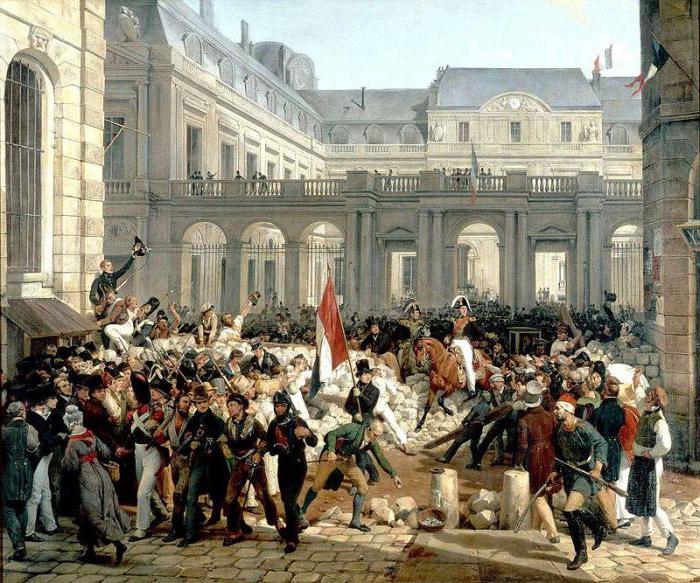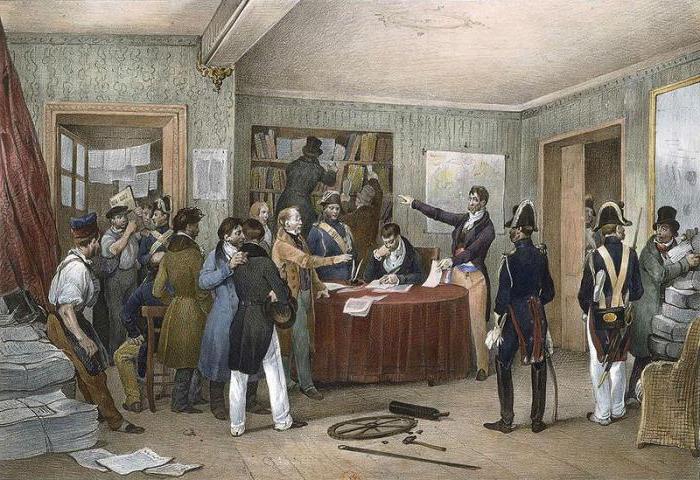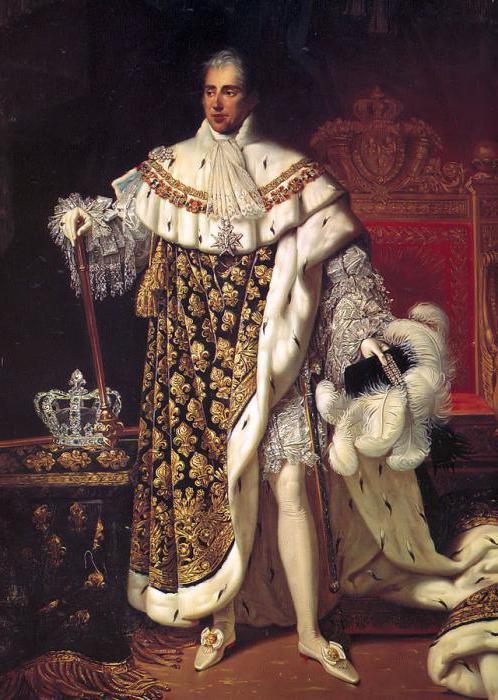The July Revolution or the French Revolution of 1830: description, history and consequences
At the end of XVIII century in France there was a GreatRevolution. The years following her were by no means calm. The coming to power of Napoleon and his conquests, which ended in defeat after the "hundred days," led to the fact that the victorious powers imposed a restoration of the Bourbons on the country. But in the reign of Louis XVIII passion did not abate. Returning influence, aristocrats craved revenge, they carried out repressions against the Republicans, and this only fueled the protest. The king was too sick to fully engage in even the most pressing problems, he was unable to advance his country forward neither economically, nor politically. But, dying of illness in 1824, he became the last French king, who was not overthrown by a revolution or a coup. Why, after his death, was the July Revolution (1830), which historians call "Three glorious days"?
Preconditions of the July Revolution of 1830: the role of the bourgeoisie
What kind the reasons for the July Revolution in France? By the 1830s, capitalism in the WesternEurope has strengthened its position. In England, the industrial revolution was coming to an end, in France the factory production also developed at a rapid pace (in this respect the country was ahead of Belgium and Prussia).
This led to increased influence of the industrialthe bourgeoisie, which was now torn to power, while the government defended the interests of exclusively aristocratic landowners and higher clergy. This adversely affected the economic development of the state. The protest moods were fueled by the defiant behavior of emigrants from the aristocratic environment, who threatened to restore the pre-revolutionary order.
In addition, the bourgeoisie, and in this environment there were manyRepublicans who supported the revolution, was dissatisfied with the strengthening of the role of the Jesuits at the royal court, in administrative institutions, as well as in schools.

The law on the remuneration of former emigrants
In 1825, a law was passed in the country, according to whichwhich emigrants from the former aristocracy received compensation of about a billion francs for the damage, that is, for the confiscated land. This law should once again strengthen the position of the aristocracy in the country. However, he aroused discontent at once with two estates - the peasants and the bourgeoisie. The latter was dissatisfied with the fact that the money payments to the nobility, in fact, were made at the expense of rentiers, since it was assumed that the means for this would be provided by the conversion of state rent from 5 to 3%, and this directly affected the incomes of the bourgeoisie.
Adopted simultaneously with this "Law onblasphemy, "in which very severe punishments were imposed for offenses against religion, and also fueled the discontent of this class, as in this they saw a return to former times.
The Industrial Crisis as a Prerequisite for the July Revolution
The causes of the July Revolution of 1830 also covered in the fact that in 1826 the country experienced an industrial crisis. It was a classic crisis of overproduction, but the first cyclical crisis that France faced after England. He was replaced by a phase of prolonged depression. The crisis coincided with several years of poor harvest, which worsened the position of the bourgeoisie, the workers and the peasantry. In cities, many were faced with the inability to find work, in the villages - with hunger.
The industrial bourgeoisie blamed theaccusing the government of reproaching the government for the fact that due to high customs duties on grain, fuel and raw materials, the cost of French goods is growing, and their competitiveness in world markets is falling.

The first barricades and changes in government
In 1827 there was, if I may say so,rehearsal of the revolution. Then, in connection with the elections to the Chamber of Deputies in Paris, there were by no means peaceful demonstrations, barricades were erected in the workers' quarters, and the rebels entered a bloody confrontation with the police.
In the same year of 1827, there were many votesliberals gathered who demanded the extension of the electoral right, the responsibility of the government to the parliament, the rights for local self-government and much more. As a result, King Charles X was forced to resign the ultra-royalist government. But the new government headed by Count Martignac, who unsuccessfully sought compromises between the bourgeoisie and the nobles, was not happy with the king. And he again sent the government to resign, formed a new cabinet of ultra-royalists and put at the head of his pet, the Duke of Polignac, a man devoted to him personally.
Meanwhile, the tension in the country has increased, and changes in the government have contributed to it.
Ordinances of 26 July and the abolition of the Charter of 1814
The king believed that with protest moodsyou can cope by tightening the regime. And on July 26, 1830, in the newspaper Monitor, ordinances were published, which, in fact, abolished the provisions of the Constitutional Charter of 1814. But it is on these terms that the states that defeated Napoleon revived the monarchy in France. Citizens of the country perceived these ordinances as an attempt of coup d'état. Moreover, these acts, depriving France of free state institutions, were exactly the same.
The first ordinance abolished freedom of the press, the seconddissolving the House of Parliament, and the third, in fact, was a new electoral law, according to which the number of deputies was reduced and the number of voters was reduced, besides, the chamber was deprived of the right to amend the adopted bills. The fourth ordinance was the opening of the session of the Chambers.

The beginning of public unrest: the situation in the capital
The king was confident in the strength of the government. No measures were taken to prevent unrest among the masses, since Prefect Mangin said that the Parisians would not move. Duke Polignac believed this, because he thought that the people as a whole are indifferent to the electoral system. As for the lower classes, it was true, but the interests of the bourgeoisie were severely touched by the ordinances.
True, the government believed that the bourgeois did notDare to take up arms. Therefore, there were only 14,000 military personnel in the capital, and no measures were taken to transfer additional forces to Paris. The king went on a hunt in Rambouillet, from where he planned to go to his residence in Saint-Cloud.

The influence of ordinances and the manifestation in the Palais Royal
Ordinances to the attention of the public did not come immediately. But the reaction to them was strong. The exchange fell heavily on rent. Meanwhile, the journalists, whose meeting was held at the editorial office of the newspaper Konstitutsionalist, decided to publish a protest against the Ordinances, which was drawn up in rather harsh terms.
On the same day, several meetings took placedeputies. However, they could not come to any general decision and joined the protesters only when they thought that the insurrection could achieve its goal. It is interesting that the judges supported the insurgents. At the request of the newspapers "Tan", "Courier Francais" and others, the commercial court and the court of first instance ordered the printing press to print regular numbers with the text of the protest, as the ordinances contradicted the Charter and could not be binding on citizens.
In the evening of July twenty-sixth, demonstrations began in the Palais Royal. The protesters shouted slogans "Down with the ministers!" The Duke of Polignac, who was riding in his carriage along the boulevards, miraculously escaped from the crowd.

Events July 27: barricades
The July Revolution in France in 1830 began27 July. On this day the printing houses were closed. Their workers took to the streets, carrying with them other workers and artisans. The citizens discussed the ordinances and the protest issued by the journalists. At the same time, Parisians learned that Marmont would be in command of the troops in the capital, which was unpopular among the people. However, Marmont himself did not approve ordinances and restrained the officers, ordering them not to start shooting until the rebels began to shoot themselves, and under firefighting he understood no less than fifty shots.
On this day in the streets of Paris rose barricades. In the evening, battles began on them, the instigators of which were mostly students. Barricades in the street of Saint Honore were taken by troops. But the riots in the city continued, and Polignac announced that Paris was in a state of siege. The king stayed in Saint-Cloud, not departing from his usual schedule and carefully concealing signs of anxiety.
Events of July 28: the riot continues
In the uprising that swept Paris, took partnot only students and journalists, but also the petty bourgeoisie, including merchants. Soldiers and officers passed over to the side of the insurgents, the latter leading the armed struggle. But the big financial bourgeoisie took a wait-and-see attitude.
But on the twenty-eighth of July it became clear that the insurrection was a mass one. It was time to decide who to join.

Events July 29: the Tuileries and the Louvre
The next day, the rebels seized the battleThe Tuileries Palace. Above him was raised the tricolor of the Great French Revolution. The troops were defeated. They were forced to retreat to the royal residence of St. Cloud, but several regiments joined the rebels. Meanwhile, the Parisians began a skirmish with the Swiss guards, which were concentrated behind the Louvre colonnade, and forced the military to flee.
These events have shown to the deputies that theside of the rebels. The decision was made by the bankers. They took over the leadership of the victorious uprising, including administrative functions and providing the rebellious city with food.
The events of July 30: the actions of the authorities
While in St. Cloud, the people tried to influenceCarla X, explaining to him the true state of affairs, in Paris, formed a new cabinet of ministers, led by the Duke of Mortemar, a supporter of the Charter of 1814. The Bourbon dynasty was no longer to be saved.
The July Revolution of 1830, which began as an uprising against the restriction of freedoms and against the government of Polignac, passed to the slogans of the overthrow of the king. The Duke of Louis Philippe of Orleans was declared the governor of the kingdom, and he had a small choice - either a government in accordance with the rebellious bourgeoisie's idea of the nature of such power, or expulsion.
On August 1, Karl X was forced to signcorresponding ordonance. But he himself abdicated in favor of his grandson. However, it no longer mattered. Two weeks later, Charles X, along with his family emigrated to England, Louis Philippe became king, the shaky order, the so-called July monarchy, which lasted until 1848, was restored.

Consequences of the July Revolution of 1830
What are the results of the July Revolution? To power in France came, in fact, large financial circles. They prevented the establishment of the republic and the deepening of the revolution, but a more liberal Charter was adopted, which reduced the property qualification for voters and expanded the rights of the Chamber of Deputies. The rights of the Catholic clergy were limited. The local self-government got more rights, although in the end all the power in the municipal councils still received large taxpayers. But the severe laws against the workers, no one thought to revise.
The July Revolution of 1830 in France accelerated the uprising in neighboring Belgium, where,however, the revolutionaries advocated the formation of an independent state. Revolutionary demonstrations began in Saxony and other German states, Poland rebelled against the Russian Empire, and in England the struggle for parliamentary reform intensified.
</ p>
